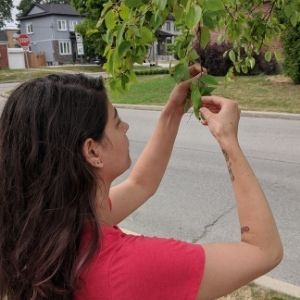The prevailing wisdom to adulthood has been: get a degree and you’re set for life. But memes about entry-level positions which require several years of previous experience tell a story that young professionals know all too well, it’s not easy to start your career. 
Up until this year, program participants (the YUFLs) met weekly with LEAF staff or industry professionals for training workshops, or with local community representatives to work on a tree planting and/or stewardship initiative in Toronto. After five months of hard work, the YUFLs presented engaging, educational tree tours within the communities where they worked and finalized their community projects. It was a successful, thriving program that helped young folk springboard into their careers. But, as we went into the sixth year of delivering the YUFL program, we were hit by a curveball that no one anticipated… a global pandemic.
As COVID-19 hit, it was clear that in-person meetings were no longer possible. Seeing the overwhelming interest in a remote training program, we decided to forge ahead with a re-imagined game plan. The cohort increased from 12 to 18 participants, with priority given to underrepresented individuals in the field of urban forestry, arboriculture and community engagement. What once were weekly in-person sessions became virtual workshops. Activities were also revamped to ensure the YUFLs had opportunities to apply new skills in their own communities. Over the course of the program, participants assessed and identified priorities for planting and stewardship within their neighbourhoods and sparked awareness for the urban forest through targeted outreach. Drawing on all that they’ve learned, the YUFLs delivered a four-part educational webinar series to showcase their skills as educators and advocates for the urban forest.
 Delivering a remote YUFL program this summer allowed folks to expand their experience and skills while staying at home, but it wasn’t the only valuable piece of the program. Other ways that the program supported the personal and professional growth of the YUFLs were through mentorship and networking. Meeting weekly built a sense of community among like-minded participants. With guidance and feedback from LEAF staff and other mentors, the YUFLs were able to discover their own strengths, take initiative and develop leadership skills. Attending workshops taught by experts was not only a masterclass in topics ranging from tree biology, to by-laws, to social media engagement, but an opportunity to grow their own networks. To cap off the program, a panel of four brilliant women, three of whom are women of colour, in the municipal, academic and non-profit sector, spoke to their successful careers and offered insights into their fields.
Delivering a remote YUFL program this summer allowed folks to expand their experience and skills while staying at home, but it wasn’t the only valuable piece of the program. Other ways that the program supported the personal and professional growth of the YUFLs were through mentorship and networking. Meeting weekly built a sense of community among like-minded participants. With guidance and feedback from LEAF staff and other mentors, the YUFLs were able to discover their own strengths, take initiative and develop leadership skills. Attending workshops taught by experts was not only a masterclass in topics ranging from tree biology, to by-laws, to social media engagement, but an opportunity to grow their own networks. To cap off the program, a panel of four brilliant women, three of whom are women of colour, in the municipal, academic and non-profit sector, spoke to their successful careers and offered insights into their fields.
The program has come to a close for this year with the last session taking place on September 29th. Now, equipped with new and refined skills and insider knowledge into the industry, the YUFLs are set to be environmental leaders and charterers of their own careers.
And we have some exciting news to share! We’re very pleased that the YUFL program will be offered in 2021! It will again be funded by the City of Toronto through an Urban Forestry Grant. So, if you know a young person who might be interested, suggest they sign up for the free LEAF newsletter so that they will be alerted when program applications open up in early 2021!
Lam Tran is the Education Coordinator at LEAF. She participated in the Young Urban Forest Leaders Program in 2016.
The Young Urban Forest Leaders Program is supported by a City of Toronto’s Urban Forestry Grant.
